An Interview with Ariel Stern Umbra Institute Fall 2013 Alum
from Brandeis University
This article is part of Umbra’s Alumni Success Series. Study abroad inspires students from all backgrounds and with all sorts of career goals. Therefore, each article in this series is meant to provide advice for current and former students interested in pursuing the types of careers our alumni hold, with some offering opportunities to connect by email or LinkedIn for further advice. Below is a brief Q&A with Ariel Stern. We encourage you to follow us on LinkedIn so you can read future features!
Alum Ariel Stern Discusses her Career
Umbra: What is your current role and what is something that you enjoy about your job?
Ariel: I am the Global Corporate Responsibility Supervisor at EY (Ernst & Young)*, located in New York. I really enjoy Empowering EY’s 270,000+ employees to participate in corporate responsibility programs, as well as creating and implementing programs for social change. Some of these programs include preparing the next generation for the Future of Work (ages 5-24) by enabling and building the confidence of underserved students and underrepresented groups to encourage them to enter (or re-enter) the job force. The best part of this job is how people from my team are based all around the world! Earlier this year I was able to travel to Australia and meet two of my colleagues.
Umbra: Are there any lessons that you have learned through your job, that you feel like the recent graduates should know?
A: If you don’t love what you do, then don’t go for it. Don’t let society dictate what your career journey is. Don’t be a “doctor” or a “lawyer” because it sounds “good”. Follow your passion.
U: What would you recommend students do while abroad if they are interested in your field?
A: I would absolutely recommend getting engaged in local volunteer opportunities within the community. When I lived in Perugia, I had an internship at the Fair-Trade store. It was very cool to learn about how important Fair Trade is for Italians. By getting engaged in community projects, you can learn how citizens of certain countries, like Italians, are able to impact society in a positive way.
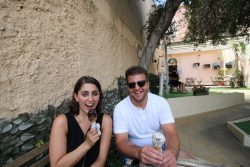
When I worked with a Fair-Trade organization in Perugia and I was able to work at a booth during the fair trade chocolate festival. It was so awesome to see all the different fair-trade organizations across Italy, as well as the Cocoa farmers from Africa, where the beans are sourced from. It was a great opportunity to see the economic model as a whole.
U: Can you explain to our readers why the “triple bottom line” will be important for their future careers??
A: In essence, [the triple bottom line] ensures that businesses are profitable for their stakeholders, while at the same time, being sustainable and giving back to society. It is extremely important in any career or job as each of our companies and the people working for them, affect climate change. I also find that you tend to feel better about doing your job when you know you are having a positive impact on the world!
U: When you think about your time in Italy, is there anything you wish you would have done differently?
A: Absolutely not— I had the most amazing three months. The most important thing I did was I stayed in Italy and traveled the country instead of going to a new country every week. Italy is amazing and there are so many cities and excursions to experience. Enjoy the food, water, culture, and all the past history.
U: Is there any more advice you would like to share with our students and alumni?
A: Learn Italian. Spend time with Italians. Learn how to cook Italian food. Learn as much as you can from the people who are the Culture.
If you have interest in EY as an organization and are looking for more information, feel free to check out these links that Ariel provided us with:
*Note that since our interview with Ariel, she has been promoted to Global Corporate Responsibility Marketing Manager at EY. Congratulations Ariel!
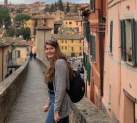 Author Bio
Author Bio
Olivia is a recent graduate of the University of Denver and chose ISI Abroad for her internship in order to gain experience in her fields of study; Communication Studies, Writing Practices, and Marketing. Olivia studied in Perugia in Fall 2019 and looks forward to sharing her love for the city with other students.


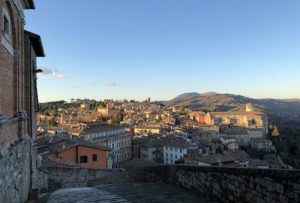


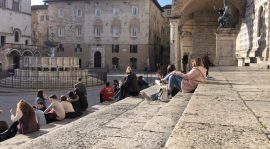 I may not be from you, but you have made me feel more than welcomed, and there’s no other place that makes me feel the way you do. You make me open my windows in the morning and stick my head out to take in the fresh Perugian air. I love your warm cappuccinos in the morning that make me think about all that I’m grateful for in life. It is the simplicity of eating a warm fluffy croissant on the steps of the piazza that makes me smile. Oh, those wonderful steps. They are comforting and always there for me. They speak to me, fulfill me and introduce me to my soon to be friends. On days filled with bright blue skies and a strong sun, I sit there and bask, soaking up the warmth. I observe the pigeons that gather and then flock. I observe the locals, strolling, arm in arm, on their afternoon walk. I overhear their conversations, the Iitalian language is a constant song I love to listen to.
I may not be from you, but you have made me feel more than welcomed, and there’s no other place that makes me feel the way you do. You make me open my windows in the morning and stick my head out to take in the fresh Perugian air. I love your warm cappuccinos in the morning that make me think about all that I’m grateful for in life. It is the simplicity of eating a warm fluffy croissant on the steps of the piazza that makes me smile. Oh, those wonderful steps. They are comforting and always there for me. They speak to me, fulfill me and introduce me to my soon to be friends. On days filled with bright blue skies and a strong sun, I sit there and bask, soaking up the warmth. I observe the pigeons that gather and then flock. I observe the locals, strolling, arm in arm, on their afternoon walk. I overhear their conversations, the Iitalian language is a constant song I love to listen to.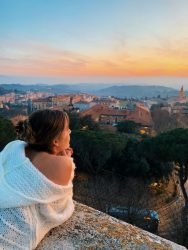
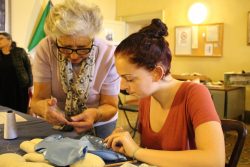
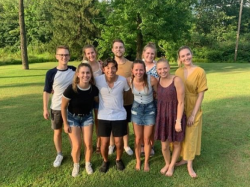
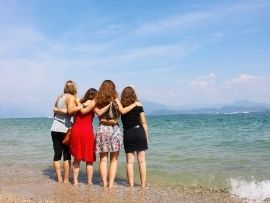 1) Set goals and make waves.
1) Set goals and make waves.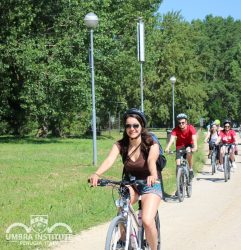 3) Plan travel around studying, not the reverse.
3) Plan travel around studying, not the reverse. 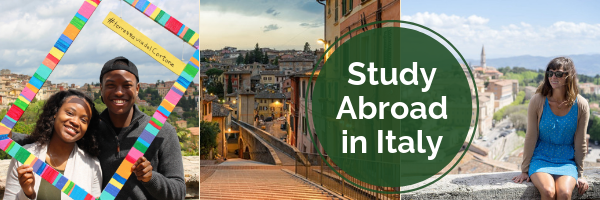
 When students choose to study abroad in Italy, one of the first things on their minds is the beauty found in walking through medieval streets, strolling across aqueducts, or meandering through museums. Italy certainly knows how beautiful she is and wants everyone to have the opportunity to experience her world-renowned art and history. For this reason, Italy allows all locals and visitors alike to tour museums for free on the first Sunday of every month!
When students choose to study abroad in Italy, one of the first things on their minds is the beauty found in walking through medieval streets, strolling across aqueducts, or meandering through museums. Italy certainly knows how beautiful she is and wants everyone to have the opportunity to experience her world-renowned art and history. For this reason, Italy allows all locals and visitors alike to tour museums for free on the first Sunday of every month!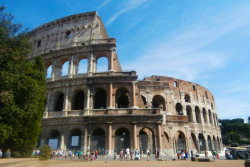 Current and future students are encouraged to plan their travel accordingly in order to take advantage of this wonderful opportunity.
Current and future students are encouraged to plan their travel accordingly in order to take advantage of this wonderful opportunity. 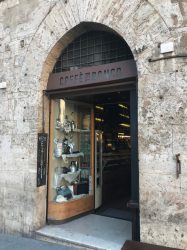
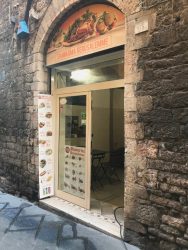 2. Shawarma Gerusalemme – Shawarma Gerusalemme is located a bit farther from Umbra, toward the bottom of Via dei Priori. The food is delicious and fresh, so I assure you that it is worth the walk. Some of their lunch options include Kebab Panino, Panino Hamburgher, Falafel e Humus, Patatine, and even Hot Dogs. The first time you eat here, I would recommend that you ask for a “punch card”. If you bring the punch card each time you eat at Shawarma Gerusalemme, your 11th meal will be free—great for students on a budget!
2. Shawarma Gerusalemme – Shawarma Gerusalemme is located a bit farther from Umbra, toward the bottom of Via dei Priori. The food is delicious and fresh, so I assure you that it is worth the walk. Some of their lunch options include Kebab Panino, Panino Hamburgher, Falafel e Humus, Patatine, and even Hot Dogs. The first time you eat here, I would recommend that you ask for a “punch card”. If you bring the punch card each time you eat at Shawarma Gerusalemme, your 11th meal will be free—great for students on a budget!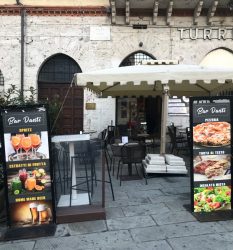 3. Bar Danti – Bar Danti is located in Piazza Danti less than a 3 minute walk from Umbra. They have outdoor seating when the weather is nice and the staff is some of the nicest people I have met while abroad. If you get to know the owners they will treat you like family. Bar Danti has a large array of options including salads, pizza, torta al testo, and smoothies. It is a great place to sit and have a quick lunch with friends.
3. Bar Danti – Bar Danti is located in Piazza Danti less than a 3 minute walk from Umbra. They have outdoor seating when the weather is nice and the staff is some of the nicest people I have met while abroad. If you get to know the owners they will treat you like family. Bar Danti has a large array of options including salads, pizza, torta al testo, and smoothies. It is a great place to sit and have a quick lunch with friends.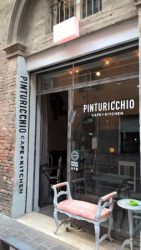 4. Pinturicchio Cafe+Kitchen – Pinturicchio is one of the only American-style cafes in Perugia, offering scrambled eggs, pancakes, cupcakes, barbecue, and much more. The atmosphere is casual and comfortable with many couches and chairs to lounge on. It is about a 10 minute walk from Umbra, but it is the perfect place to go if you want to sit, do homework, and sip a warm cup of coffee.
4. Pinturicchio Cafe+Kitchen – Pinturicchio is one of the only American-style cafes in Perugia, offering scrambled eggs, pancakes, cupcakes, barbecue, and much more. The atmosphere is casual and comfortable with many couches and chairs to lounge on. It is about a 10 minute walk from Umbra, but it is the perfect place to go if you want to sit, do homework, and sip a warm cup of coffee.


 About the Author:
About the Author: